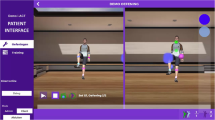Abstract
The InCoPE-App is a mobile application that allows nursing home staff to test and train physical performance and cognition of indiviuals with dementia (IWD). In times of COVID-19, this is a novel and innovative approach which allows nursing homes to maintain a physical activity routine while complying with hygiene and safety measures as no external exercise instructor is needed. The aim of the present study was to evaluate the usability of the InCoPEApp on the base of an expert user review as the first step of an iteratively structured evaluation phase. Seven interdisciplinary experts performed standardized tasks within the InCoPE-App and completed the System Usability Scale (SUS). The results show that there is action required to improve the usability before the 2nd phase of the evaluation will take place in a laboratory setting and subsequently the 18-weeks field intervention involving end users.
Access this chapter
Tax calculation will be finalised at checkout
Purchases are for personal use only
Similar content being viewed by others
References
Barisch-Fritz, B., Barisch, M., Trautwein, S., Scharpf, A., Bezold, J., Woll, A.: Designing a mobile app for treating individuals with dementia: combining UX research with sports science. In: Lames, M., Danilov, A., Timme, E., Vassilevski, Y. (eds) Proceedings of the 12th International Symposium on Computer Science in Sport (IACSS 2019). IACSS 2019. Advances in Intelligent Systems and Computing, vol. 1028, pp. 185–192. Springer, Cham (2020). https://doi.org/10.1007/978-3-030-35048-2_22. https://publikationen.bibliothek.kit.edu/1000104875
Blankevoort, C.G., van Heuvelen, M.J.G., Boersma, F., Luning, H., de Jong, J., Scherder, E.J.A.: Review of effects of physical activity on strength, balance, mobility and ADL performance in elderly subjects with dementia. Dement. Geriatr. Cogn. Disord. 30(5), 392–402 (2010). https://doi.org/10.1159/000321357
Brooke, J.: Sus: a retrospective. J. Usabiliy Stud. 8(2), 29–40 (2013)
Free, C., et al.: The effectiveness of mobile-health technology-based health behaviour change or disease management interventions for health care consumers: a systematic review. PLoS Med. 10(1), e1001362 (2013). https://doi.org/10.1371/journal.pmed.1001362
Groot, C., et al.: The effect of physical activity on cognitive function in patients with dementia: A meta-analysis of randomized control trials. Ageing Res. Rev. 25, 13–23 (2016). https://doi.org/10.1016/j.arr.2015.11.005. https://pubmed.ncbi.nlm.nih.gov/26607411/
ISO Central Secretary: Systems and software engineering — systems and software quality requirements and evaluation (square) — system and software quality models. Standard ISO/IEC 25010:2011. In: International Organization for Standardization, Geneva, CH (2011). https://www.iso.org/standard/62711.html
Kushniruk, A.W., Patel, V.L.: Cognitive and usability engineering methods for the evaluation of clinical information systems. J. Biomed. Inform. 37(1), 56–76 (2004). https://doi.org/10.1016/j.jbi.2004.01.003
Lewis, J.R.: The system usability scale: past, present, and future. Int. J. Hum.-Comput. Interact. 34(7), 577–590 (2018). https://doi.org/10.1080/10447318.2018.1455307
Maramba, I., Chatterjee, A., Newman, C.: Methods of usability testing in the development of eHealth applications: a scoping review. Int. J. Med. Informatics 126, 95–104 (2019). https://doi.org/10.1016/j.ijmedinf.2019.03.018
van Kuijk, J., van Driel, L., van Eijk, D.: Usability in product development practice; an exploratory case study comparing four markets. Appl. Ergon. 47, 308–323 (2015). https://doi.org/10.1016/j.apergo.2014.10.007
Zapata, B.C., Fernández-Alemán, J.L., Idri, A., Toval, A.: Empirical studies on usability of mHealth apps: a systematic literature review. J. Med. Syst. 39(2), 1 (2015). https://doi.org/10.1007/s10916-014-0182-2
Author information
Authors and Affiliations
Corresponding author
Editor information
Editors and Affiliations
Rights and permissions
Copyright information
© 2022 The Author(s), under exclusive license to Springer Nature Switzerland AG
About this paper
Cite this paper
Barisch-Fritz, B. et al. (2022). InCoPE-App: A Digital Solution to Train Individuals with Dementia. Usability Review Based on Expert User Experiences. In: Baca, A., Exel, J., Lames, M., James, N., Parmar, N. (eds) Proceedings of the 9th International Performance Analysis Workshop and Conference & 5th IACSS Conference. PACSS 2021. Advances in Intelligent Systems and Computing, vol 1426. Springer, Cham. https://doi.org/10.1007/978-3-030-99333-7_24
Download citation
DOI: https://doi.org/10.1007/978-3-030-99333-7_24
Published:
Publisher Name: Springer, Cham
Print ISBN: 978-3-030-99332-0
Online ISBN: 978-3-030-99333-7
eBook Packages: Intelligent Technologies and RoboticsIntelligent Technologies and Robotics (R0)




